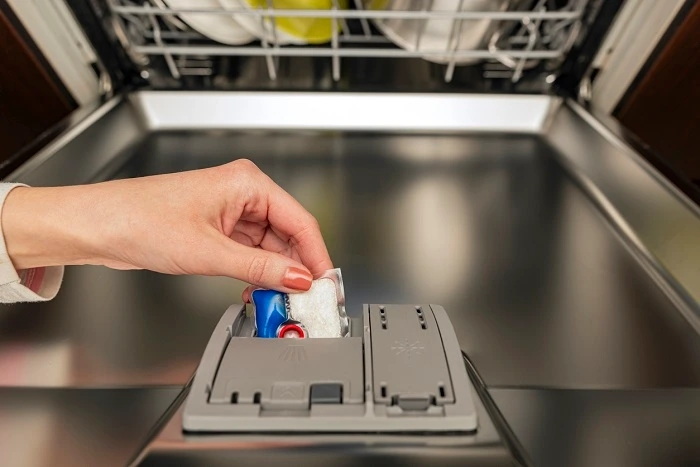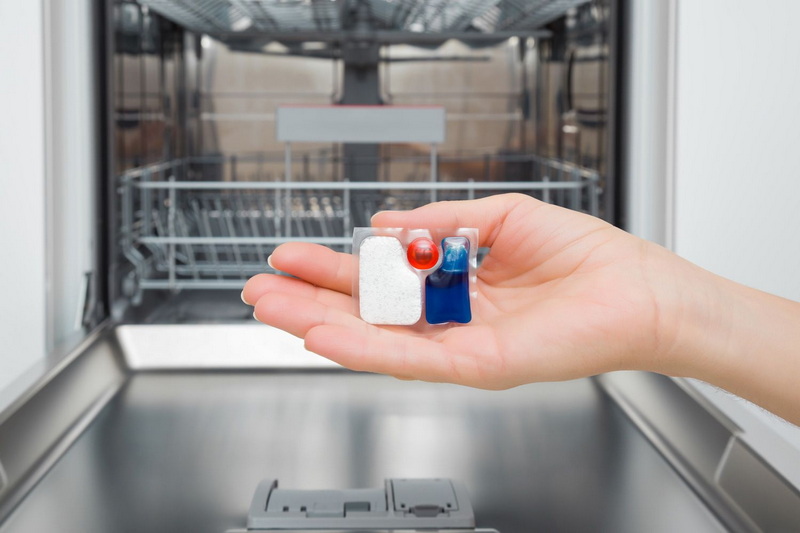Dongguan UFine Daily Chemical Co.,Ltd.
- All
- Product Name
- Product Keyword
- Product Model
- Product Summary
- Product Description
- Multi Field Search
Views: 222 Author: Tomorrow Publish Time: 11-26-2025 Origin: Site











Content Menu
● Understanding Countertop Dishwashers
● Can You Use Soap Pods in a Countertop Dishwasher?
● Why Soap Pods Might Cause Problems in Countertop Dishwashers
● Dishwasher Detergents: Types and How They Perform
● Choosing the Right Detergent for Your Countertop Dishwasher
● Maintenance Tips for Countertop Dishwashers
● Environmental Considerations
● FAQ
>> 1. Can I use any brand of soap pods in my countertop dishwasher?
>> 2. What happens if a soap pod doesn't fully dissolve?
>> 3. Are powder detergents better than pods for countertop dishwashers?
>> 4. How much detergent should I use in a countertop dishwasher?
>> 5. Can using the wrong detergent damage my dishwasher?
Countertop dishwashers are widely valued for their space-saving convenience and efficient performance in small kitchens, apartments, and offices. One common question users have is whether soap pods can be used safely and effectively in these compact machines. The answer depends on several factors related to dishwasher design, detergent formulation, and cycle conditions. This expanded article covers those aspects thoroughly, integrating authoritative info on detergent types and usage best practices.

Countertop dishwashers are compact, portable units that connect to a kitchen faucet and typically drain into a sink. They use a smaller volume of water per cycle, often ranging from about 2 to 3 gallons, significantly less than full-sized models. Because of this reduced water usage and the smaller interior space, detergents must be carefully chosen and dosed to avoid residue and ensure complete cleaning. Most models feature detergent dispensers designed for powder or liquid detergents, but compatibility with soap pods varies by manufacturer.
Soap pods, also referred to as dishwasher detergent pods or packs, are pre-measured single-dose units wrapped in a water-soluble film. Each pod contains a blend of cleaning agents including enzymes, surfactants, rinse aids, and sometimes water softeners, formulated to optimize dishwashing performance. The convenience of pods stems from their pre-measured dosing and ease of use, eliminating guesswork or mess.
Yes, soap pods can be used in many countertop dishwashers, but with specific considerations. Because these dishwashers operate with less water and sometimes at lower temperatures, a full-sized pod formulated for standard dishwashers may not dissolve completely, leading to residue buildup on dishes and in the machine. Some manufacturers recommend avoiding pods or advise using only pods specifically designed for compact or portable units.
To avoid problems, users can:
- Opt for smaller or half-sized pods suited for low water volume.
- Place pods properly, either in the designated dispenser or as instructed in the user manual.
- Select wash cycles with sufficient water and heat to dissolve detergent fully.
- Monitor the dishwasher after cycles for any undissolved detergent or residue.
Countertop dishwasher issues with soap pods primarily result from water volume and temperature constraints. Incomplete pod dissolution causes detergent films on glassware and dishes, clogging filters or spray arms, and excessive sudsing that potentially leads to leaks. Because these machines have shorter cycles and less water to dilute detergent, pods optimized for larger dishwashers may release too concentrated a detergent dose for compact models.
Additionally, some pods contain more enzymes or bleaching agents, effective in larger volumes but overwhelming small water systems. This can impair rinsing effectiveness and leave streaks or spots.
Dishwasher detergents generally come in four forms: pods/pacs, powders, gels/liquids, and detergent sheets. Consumer testing and reviews provide insights into their performance, especially related to compact dishwashers.
- Pods and Packs: Widely regarded as highly effective for standard dishwashers, pods combine precision dosing with strong cleaning formulations that remove baked-on grime, starches, and grease. Studies show that premium pods like Cascade Platinum ActionPacs and Finish Powerball Ultimate deliver superior cleaning and resistance to film and discoloration. However, their concentration can be too high for small machines unless smaller formulations or half pods are used.
- Powders: Powder detergents allow flexible dosing and typically dissolve quickly, making them easier to adjust for the lower water volume of countertop dishwashers. While sometimes considered less convenient, powders such as Cascade Complete Powder provide strong cleaning power, good grease-cutting ability, and reduced risk of leftover residue in compact units.
- Gels/Liquids: Gels and liquids dissolve rapidly and flow easily in low-water cycles but often lack the concentrated enzymes or bleach boosters found in pods, resulting in somewhat lower cleaning effectiveness on heavily soiled items. Nevertheless, some gels specifically formulated for compact dishwashers can work well.
- Detergent Sheets: Emerging as eco-friendly and convenient alternatives, detergent sheets fully dissolve without clumping or residue and are gentle on septic systems. While suitable for lighter loads, tough baked-on stains may require more potent formulations.

For countertop dishwasher users who want to try pods, selecting the right brand and size is critical. Lower-dose pods designed for portable machines or environmentally friendly options with biodegradable films tend to dissolve better and minimize residue. If full pods are too potent, cutting them in half or using powder/liquid detergents tailored to your appliance's water volume and cycle length can improve results.
Best practices involve:
- Confirming detergent compatibility in your dishwasher manual.
- Starting with smaller doses and observing cleaning and residue outcomes.
- Using rinse aids to enhance water sheeting and reduce spotting.
- Running occasional cleaning cycles with vinegar or dishwasher cleaner to prevent buildup.
Regular maintenance optimizes performance regardless of detergent type. Important tasks include:
- Cleaning filters regularly to prevent clogging.
- Wiping down the interior to avoid film buildup.
- Checking spray arms for debris to maintain water flow.
- Running monthly empty cycles with hot water and cleaning agents to reduce odors and scale.
While soap pods are convenient, the plastic-based water-soluble films contribute to microplastic pollution. Choosing detergents with compostable packaging, biodegradable films, or powder forms can reduce environmental impact. Countertop dishwashers themselves save water and energy compared to handwashing, so pairing them with eco-friendly detergents supports sustainable cleaning.
Soap pods can be used in countertop dishwashers if chosen and dosed carefully. The limited water volume and shorter cycles of these compact machines mean that full-sized pods may not dissolve completely, causing residue and operational issues. Users should refer to their dishwasher's guidelines, test smaller pod quantities or alternative detergents like powders or liquids, and maintain the appliance regularly. This approach ensures clean dishes without detergent buildup, prolongs dishwasher life, and supports sustainable kitchen practices.

Only pods designed for or compatible with compact or portable dishwashers should be used. Full-size or multi-chamber pods meant for standard dishwashers may not dissolve properly.
Undissolved detergent can leave residue on dishes, clog filters, and reduce dishwasher performance. Remove residue manually and try a different detergent form or smaller doses.
Powders offer flexible dosing and dissolve quickly, often making them more suitable for small dishwashers with low water volume.
Typically, one teaspoon to one tablespoon of powder or liquid detergent suffices. For pods, use half pods if possible to avoid over-concentration.
Yes, excessive suds or buildup can clog components or lead to leaks, decreasing efficiency or causing costly repairs.
[1](https://www.consumerreports.org/appliances/dishwasher-detergents/best-dishwasher-detergents-from-consumer-reports-tests-a9174621249/)
[2](https://www.nytimes.com/wirecutter/reviews/best-dishwasher-detergents/)
[3](https://www.heysunday.com/blog/best-dishwasher-detergent)
[4](https://www.reddit.com/r/HomeMaintenance/comments/1achy17/best_form_of_dishwasher_detergent/)
[5](https://www.consumerreports.org/appliances/dishwasher-detergents/buying-guide/)
[6](https://havalab.com/blogs/news/dishwasher-detergents-which-is-better)
[7](https://orbasics.com/blogs/stories/best-non-toxic-dishwasher-detergent-brands)
[8](https://portablecountertopdishwasher.net/countertop-dishwasher-detergent/)
[9](https://www.techgearlab.com/topics/kitchen/best-dishwasher-pod)
[10](https://www.houzz.com/discussions/6036254/best-detergents-for-an-18-dishwasher)
Top 6 Commercial Dishwasher Detergent Suppliers in The World (2026 OEM & Buyer's Guide)
The 10 Best Liquid Dishwasher Detergents for 2026 (Complete Guide for Consumers And OEM Buyers
The 12 Best Dishwasher Pods in 2025 (Plus A Practical OEM Buyer’s Guide)
Top 8 Dish Detergent Manufacturers in 2026 (OEM & Private Label Guide)
10 Best Non-Toxic Dishwasher Detergents in 2026: Safe, Eco-Friendly & OEM-Friendly Guide
How To Make Homemade Dishwasher Cleaner Without Vinegar (2026 Guide + OEM Insights)
Difference Between Soap And Laundry Detergent (A Complete OEM Guide)